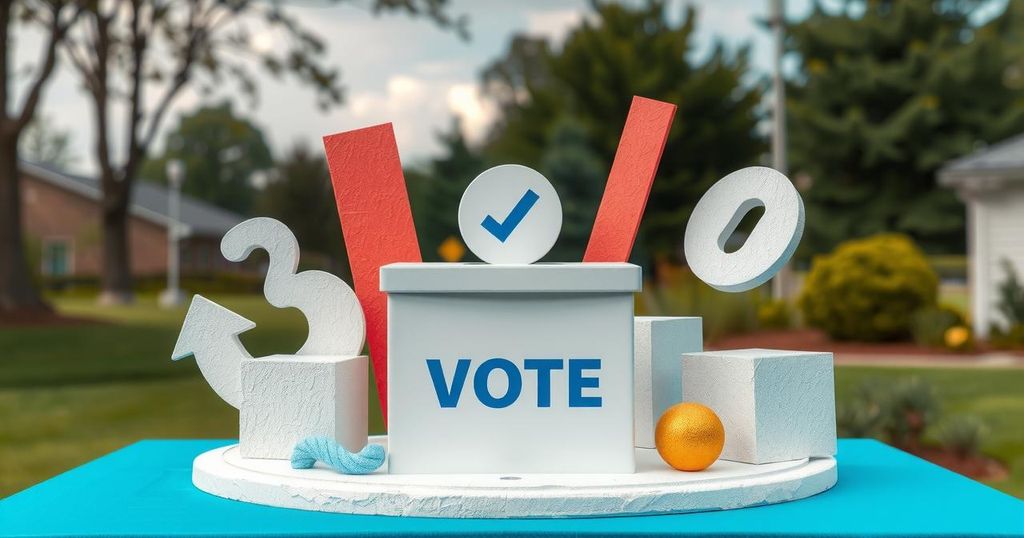Ecuador’s Critical Election Run-Off: Noboa and Gonzalez in Tight Race

Ecuador faces an election run-off with President Daniel Noboa narrowly leading Luisa Gonzalez amid rising crime rates and economic distress. With over 90 percent of the votes counted, Noboa has 44.3 percent and Gonzalez 43.8 percent. This election is regarded as a referendum on Noboa’s policies and the broader socio-economic landscape of Ecuador.
Ecuador is navigating a critical election run-off as incumbent President Daniel Noboa holds a narrow lead against leftist challenger Luisa Gonzalez. After the counting of over 90 percent of ballots, Noboa secured 44.3 percent, while Gonzalez garnered 43.8 percent. Gonzalez declared a “great victory” amidst her supporters in Quito, emphasizing that their campaign efforts resulted in what she termed a “statistical tie.”
Expectations prior to the election had forecasted Noboa to potentially secure over 50 percent of the vote and thus avoid a second round. The political landscape is viewed as a referendum on Noboa’s hardline security policies in response to escalating crime rates linked to drug cartels.
Under Noboa’s administration, Ecuador has witnessed a troubling transformation, deteriorating from a relatively safe nation to one afflicted by rampant crime, largely attributed to control over cocaine trading routes. Noboa’s governance has included declaring a state of emergency and deploying the army to combat violence.
Security measures on election day were heightened, marked by an army presence at polling stations and closures of borders with Colombia and Peru. Notably, this election was shaped by fears stemming from prior political violence, including the assassination of a candidate earlier this year.
Despite a tense atmosphere, incidents during the election were minimal, with just a handful of individuals cited for violating an alcohol ban. The mood among Noboa’s supporters was celebratory, with many expressing hopes for socio-economic improvements.
Gonzalez’s political mentor, exiled former President Rafael Correa, expressed confidence in their campaign strategy, stating, “We are going to PASS Noboa.” Noboa, at just 37 years old, represents a younger generation of leadership, employing a vibrant social media campaign contrasting with his strict crime policies.
Political analysts highlight Ecuador’s current crisis as one of the most severe since the revival of democracy, indicating the repercussions of unrest on tourism and investment. Noboa has sought assistance from the International Monetary Fund amidst economic decline.
Gonzalez has assured that her administration would maintain favorable relations with the IMF, advocating against policies that could harm working families. Additionally, she has voiced a desire for respectful treatment of Ecuadorian migrants facing deportation under U.S. policies.
Overall, the election results reflect a deeply divided electorate confronting economic challenges and a surge in violence as candidates prepare for the impending run-off.
Ecuador’s election is predominantly framed as a reaction to President Noboa’s response to increasing violence and economic instability within the country. Following a dramatic escalation in crime rates due to drug cartel activity, Noboa’s administration took bold steps, including deploying military forces in civilian contexts, which has elicited significant scrutiny and concern from human rights advocates. Candidates toiled to address the economic issues plaguing Ecuador, with the looming fiscal crisis requiring international aid. The political climate is heavily influenced by public sentiment toward security measures, economic policies, and the handling of migration issues stemming from U.S. deportation actions.
In conclusion, Ecuador’s election run-off encapsulates a pivotal moment as voters navigate complex issues surrounding violence, governance, and economic pressure. The close race between Noboa and Gonzalez indicates a nation grappling with the consequences of harsh security policies and an economy in distress. As the nation looks toward a second round, the path forward remains fraught with challenges and expectations for change.
Original Source: www.kten.com








